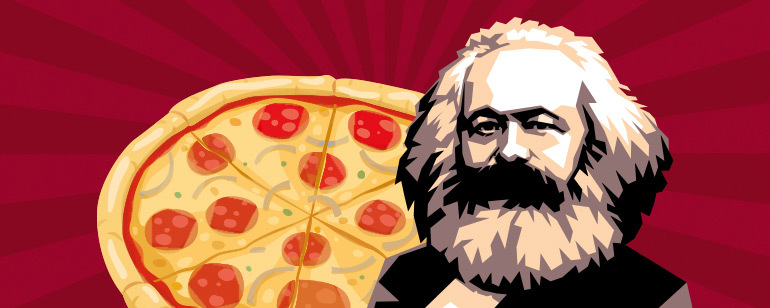The economy isn’t a giant spaghetti monster. We observe the economy around us through the price of petrol, the minimum wage, the stock market, and the global political theater. David Mizzi analyses one philosopher’s musings on economy and labour.
Whether we like it or not, we are all involved in the economy. When we buy our groceries or when we get paid, we are participating in it. When we give our children pocket money, we are teaching them about it. Every time we open our wallets, purses, or piggy banks, we are driving the economic wheel. Yet, even though we are constantly involved in the economy, do we actually understand it? The economy is something that we prefer to let our politicians and economists worry about. The only way to break through the mysticism surrounding the economy is to understand it.
Marxism through Pizza
According to Marx, the value of a produced good can be measured objectively by the average number of labour-hours required to produce it. For instance, the value of a pizza depends on the cost of flour, tomato sauce, cheese, pineapple chunks (yes, deal with it), the wood or coal or electricity cost of running the oven, and the amount of work (or labour-hours) it takes to prepare the pizza. That last point is what we should be thinking about.
Through economics, an individual’s relationship to the products they create changes. You are no longer producing items for your own needs (eg pizza because you are hungry), but producing for others (eg producing pizza for your boss to sell to customers). Note that you’re not producing pizza for other people because they are hungry either (as you would when you invite friends over), but because someone else (your boss) wants to sell pizza to other people to make money. But let’s step away from pizza for a moment, and look at history — specifically the industrial revolution.
The industrial revolution allowed a small group of people to seize control of production through factories. This effectively concentrated wealth into the hands of a small group of people. Now the focus has shifted from the products that the factories produce, to maximising company profits. In order to create surplus value, labour time is artificially suppressed.
To put it another way, if I want to increase my profits, I can either increase the selling price or reduce production costs. So if a pizza that sells for €15 costs me €5 to make, I can increase my €10 profit by reducing the cost to make it, in this case, by paying the pizzaiolo less.
Instead of enjoying the fruits of my labour, I am paid a wage. By being paid a wage, I myself have become a commodity that can be bought, haggled over, and traded.
Marx witnessed this exploitation first hand during the 19th century, the heyday of the industrial revolution, when people (including children) worked over 10 hours a day in factories to mass produce goods for a pittance. For Marx, this would eventually lead to the working class revolting against exploitation and taking control of the means of production. Whether this would happen through peaceful means or violent revolution is something which Marxists have debated for decades.
Capitalism enables alienation, and this is what really interests us. Whilst in medieval times, a pizzaiolo was responsible for the entire creation process of a pizza (from creation to selling),the industrial revolution brought about the assembly line process. Instead of being invested in the quality of each pizza created, the pizzaiolo is only concerned with making enough to meet demand. Unless the pizzaiolo owns the pizzeria, their primary concern is their salary — pizza quality is secondary. Not only is the worker alienated from their fellow human, as capitalism puts us in a state of constant competition for our job, but we are also alienated from the fruits of our labour. Instead of enjoying the fruits of my labour, I am paid a wage. By being paid a wage, I myself have become a commodity that can be bought, haggled over, and traded.
Marxism and the Modern Capitalist
In the 1970s, historian Studs Terkel wrote his non-fiction book Working: People Talk About What They Do All Day and How They Feel About What They Do. In it, he interviews a number of individuals about their work, including Mike Lefevre, a 37-year old labourer in a steel mill near Chicago. Lefevre points out that he doesn’t get excited about his work, because there is no sense of purpose in it. He says, ‘Picasso can point to a painting. What can I point to? A writer can point to a book. Everybody should have something to point to.’
Further on in the book, Heather Lamb, a long-distance telephone operator, talks about the dehumanizing monotony of her job: spending the whole day talking but limited to only a handful of phrases. ‘You’re just an instrument. You’re there to dial a number.’
This desire to have something to ‘point to,’ as Lefevre aptly puts it, highlights how alienated capitalism can leave us — and how strong our instinct to take pride in our work really is.
Of course, after 50 years, we would like to think that this has changed. In order to compensate for the ‘meaninglessness’ of the daily grind, corporations have attempted to give their employees a sense of purpose. For Starbucks, the mantra is: ‘Inspire and nurture the human spirit — one person, one cup, one neighbourhood at a time’, while for everyone’s favourite social media mogul, Facebook: ‘Give people the power to share and make the world more open and connected.’ Circumventing the cringe-worthy attempts to inspire their workforce, where does this leave Marxism and a worker’s sense of purpose?
The Value of Work
The issue with Marxism is that it propagates a dichotomy: us vs them, the bourgeoisie vs the proletariat, the boss vs the worker, the capitalist vs the socialist. It paints a picture in black or white.
However, is it fair to pin the blame squarely on the shoulders of the capitalist? The sense of pride in one’s work has been brazenly replaced with concerns about profit, and profit alone. But this materialistic obsession has trickled down to the workers themselves and left us completely alienated.
Having become so alienated from our creations and instead so concerned with our own personal profits has left us with a careless and self-serving attitude.
It is no longer just the ‘boss’ who exploits the workers. The workers themselves are doing what they can to exploit the system: ‘I can leave an hour early and still get paid.’ ‘This person doesn’t know the value of what they’re buying, I’ll overcharge them.’ ‘Why should I care that the building I erect stands? My supervisor doesn’t care, why should I?’ ‘So long as I get paid, it doesn’t matter.’
Having become so alienated from our creations and instead so concerned with our own personal profits has left us with a careless and self-serving attitude. This attitude ends up absolving acts which might seem minor from our perspective (such as arriving late to work, or filching stationary supplies), but when they occur on a larger scale (such as in politics), it becomes a problem.
While the capitalist system has left us alienated from our work (and corporate management’s attempt to reel us back in are ridiculous at best), it is up to us to find value in our work and our lives in general. We must redefine the value of work and rather than being solely concerned with our salary and exploiting as much as we can, instead take pride in our labour, hold people accountable for their duties, and find something worth pointing to. In short, can we have great pizza again?
But what are your thoughts on Marxism? What sort of relationship should we have and cultivate in our work? Should our focus be limited solely to our salary? Is it the role of management to provide work with purpose, or is it up to us?
References
Dao, A. (2020). Bad Attitude. Newphilosopher, (29), 47-49.
Hines, K. (2020). Meaning in the Executive Suite. Philosophy Now, (138), 6-7.Stumpf, S. (1994). Philosophy (pp. 412-415). New York: McGraw-Hill.






Comments are closed for this article!